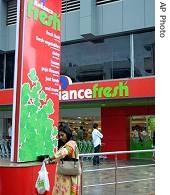2007年VOA标准英语-Opposition to Large Retail Stores Grows in Indi(在线收听)
New Delhi
26 August 2007
In India, efforts by multinationals to grab a slice of the country's growing retail business are meeting strong opposition from traders and farmers, who fear new mega stores will edge them out of business. As Anjana Pasricha reports from New Delhi, a chain of supermarkets in the country's most populous state have been temporarily shut by the state government following violent protests.

Woman walks outside a Reliance Fresh supermarket in Hyderabad, India
The Uttar Pradesh government ordered several supermarkets to shut down after traders and local activists smashed windows and ransacked several outlets opened recently in the cities of Lucknow and Varanasi.
The stores belong to the Indian conglomerate Reliance Industries. Uttar Pradesh Chief Minister Mayawati says the stores were closed due to fears that law and order could deteriorate.
Mayawati says the supermarkets will remain shut until a committee established to look into the issue submits its report.
Reliance Industries is one of several Indian companies investing billions of dollars to establish countrywide retail chains to grab part of a $350-billion market.
But opposition to the big supermarkets is growing in a country where "mom and pop" stores dominate the landscape. Small shopkeepers complain that new mega-stores are taking away their business.
Protests have been witnessed in recent months not only in Uttar Pradesh, but also in states such as Jharkhand, Madhya Pradesh and West Bengal.
And earlier this month, traders and activists led nationwide demonstrations against the entry of U.S. retailer Walmart, which plans to establish cash-and-carry wholesale stores.
Walmart is coming into the wholesale business, because so far the Indian government has resisted pressure to give foreign companies direct access to the retail business.
Now, domestic companies are worried that growing opposition from traders and farmers could prompt state governments to slow down their entry into the sector.
There have been reports that some states may limit the size of stores and the number companies can open.
The retail sector is politically sensitive because it generates the most jobs after agriculture. It provides employment to 40 million people directly, and many more indirectly. This huge bloc of traders and farmers adds up to crucial votes at election time.
Advocates of large chain stores say they will reduce consumer prices, increase product selection, and, by using efficient transportation and cold storage facilities, reduce food spoilage.